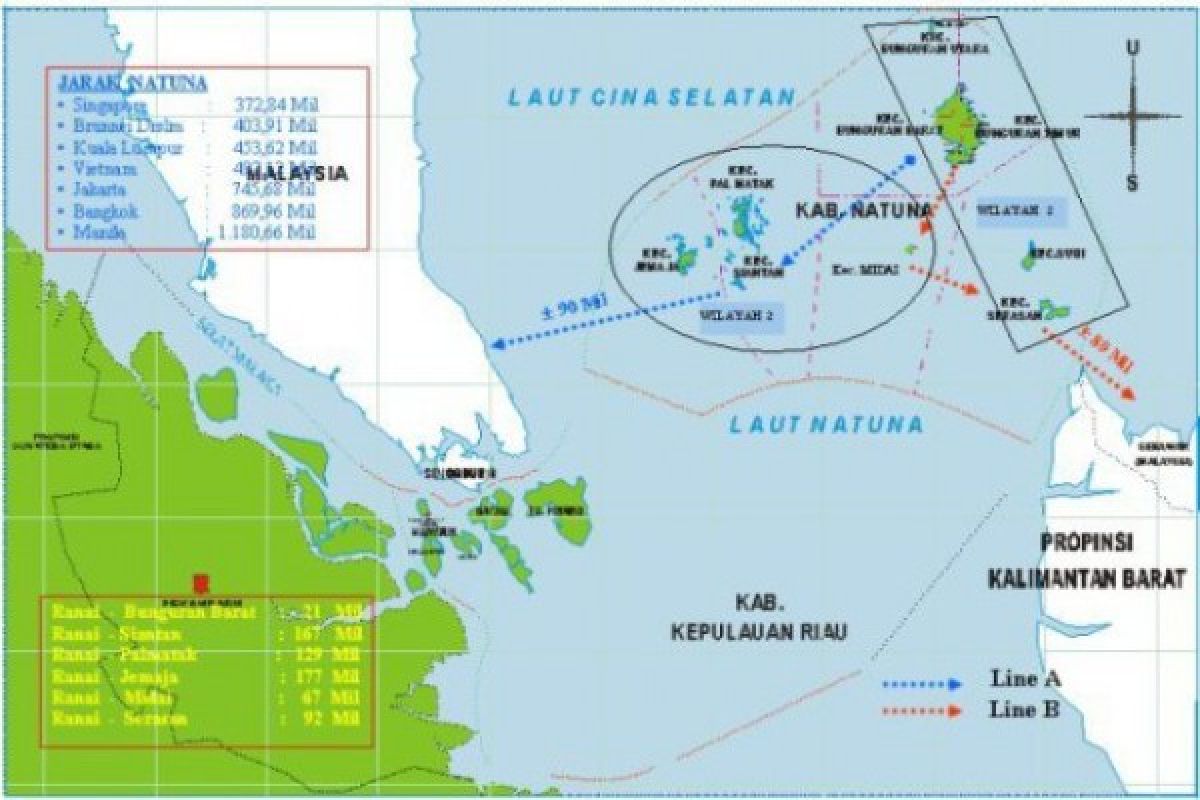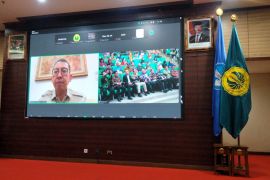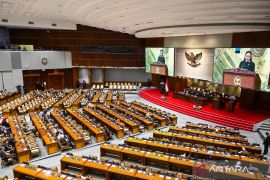China said the incident occurred in "traditional fishing grounds" of China, but according to an Indonesian international law expert Hikmahanto Juwana, the UNCLOS, in which Indonesia and China are both participants, does not recognize the concept of "Jakarta (ANTARA News) - Indonesias Maritime Affairs and Fisheries Minister Susi Pudjiastuti was seemingly furious when she received a report about a Chinese flagged fishing vessel and a coast guard vessel violating the countrys territorial waters off Natuna Island.
As per the report, her ministrys patrol ship Hiu 11 had intercepted and detained FV Kway Fey 10078 on March 19 for fishing illegally in Indonesian waters off Natuna, Riau Islands.
However, just when the Kway Fey, weighing 200 gross tonnage (GT), was being taken away by the Hiu 11, a Chinese coast guard ship came all of a sudden and hit KM Kway Fei, ostensibly to prevent the Chinese fishing vessel from being taken to the Indonesian shore.
To prevent a clash, the maritime and fishery ministry (KKP) officers left FV Kway Fey and returned to the Hiu 11, bringing along eight crew members of the Chinese fishing vessel.
The minister told reporters on March 20 itself of her intention to "lodge a strong diplomatic protest," since the incident had taken place in the Indonesian economic exclusive zone (EEZ).
"The intervention by the Chinese coastguard ship was a blatant violation of Indonesian sovereignty," the minister said, adding she would summon the Chinese ambassador for explanation.
In response to Indonesias accusations, Chinese Foreign Ministry spokesperson Hua Chunying, however, the incident had occurred in "traditional fishing grounds" of China and that Chinese coastguards had assisted the fishing boat after it was detained by an Indonesian patrol boat.
Hua told a press conference in Beijing on March 21 that the Chinese coastguards did not enter Indonesian waters and his government also recognized Indonesias sovereignty over the Natuna Islands.
He urged Jakarta to resolve the dispute through consultations and peaceful negotiations.
Minister Susi Pudjiastuti, however, deplored Chinas unilateral claim that its fishing vessel caught by Indonesia recently was operating within Chinas "traditional fishing grounds."
She said the Chinese claim of describing the area in Natuna as its "traditional fishing grounds" was wrong and not recognized by international law, including the UN Convention on the Law of the Sea.
The Indonesian government has sent a note of protest to the Chinese government concerning the incident.
The note of protest was presented to Chinese Charge dAffaires Sun Weide as the Chinese ambassador, Xie Feng, was abroad.
Indonesian Foreign Minister Retno LP Marsudi told the press on March 21: "This morning, I summoned the Chinese embassys charge daffairs to convey our protest covering three issues."
The first issue was about the violation committed by the Chinese coast guard ship. It violated Indonesias sovereignty and jurisdiction over the Exclusive Economic Zone and the continental shelf area.
Second issue involved interference in Indonesian law enforcers efforts to enforce the law in the EEZ and the continental shelf area.
Third was about Chinese coastguards violating Indonesias sea territorial sovereignty.
"I also emphasized the importance of respecting international laws, including UNCLOS 1982. I have reiterated that Indonesia is not a claimant state over South China Sea," she said.
Retno Marsudi said Indonesia wants to maintain good relations with China despite the fishing dispute.
"We have a good relationship with China. We will strive to maintain our good relations along with ensuring that international laws are observed," Retno Marsudi said.
Indonesian waters have become a target of illegal fishing as the catch is become scarce in the oceans.
Indonesias potential loss in income due to illegal fishing activities is estimated to reach trillions of rupiahs per year.
Minister Susi has often reiterated that illegal fishing is a crime insulting the sovereignty of many nations; therefore, illegal fishing has to be eliminated.
The Chinese fishing boat caught poaching fish in the Indonesian waters was not the first case of its kind.
Similar instances also happened in 2013 in Natuna waters and in 2014 in eastern Indonesian waters.
Reuters reports that China and Indonesia have had similar incidents in the past, including in 2010, when a Chinese maritime enforcement vessel had forced an Indonesian patrol boat to release a trawler detained for alleged illegal fishing.
In the meantime, the Indonesian government's firm stance following the latest incident has been lauded by some legislators.
Chairman of the Commission I of the House of Representatives (DPR) Mahfudz Siddiq said on March 22 that the fishing dispute with China is a serious incident.
"I support the note of protest sent by the Indonesian government through the foreign ministry to the Chinese government," Siddiq, politician of the Prosperous Justice Party, said, adding that "the case concerns a serious violation."
Lawmaker Tantowi Yahya of Golkar Party said the government has done the right things by sending the protest note.
He hoped that the Chinese government would respond to the protest properly to demonstrate mutual respect and appreciation.
Tantowi also urged the government to strengthen its presence and intensify activities in Natuna Islands and its Exclusive Economic Zone (EEZ) waters to prevent a possible territorial claim by foreign countries.
In the meantime, Hikmahanto Juwana, an international law expert from the University of Indonesia, said the excuse put up by the Chinese government, which reportedly claimed that the China-flagged vessel was operating in "traditional fishing grounds," could not be justified.
"This is because the UNCLOS, in which Indonesia and China are both participants, does not recognize the concept of traditional fishing ground," Hikmahanto said in a statement on March 21.
The incident would affect good relations between the two countries, he remarked.
"It is not impossible that the Indonesian government steps back from its position as a mediator on territorial disputes in the South China Sea. The Indonesian government may even evaluate its bilateral economic cooperation, including on infrastructure development and loans," he said.(*)
Reporter: Fardah
Editor: Heru Purwanto
Copyright © ANTARA 2016












